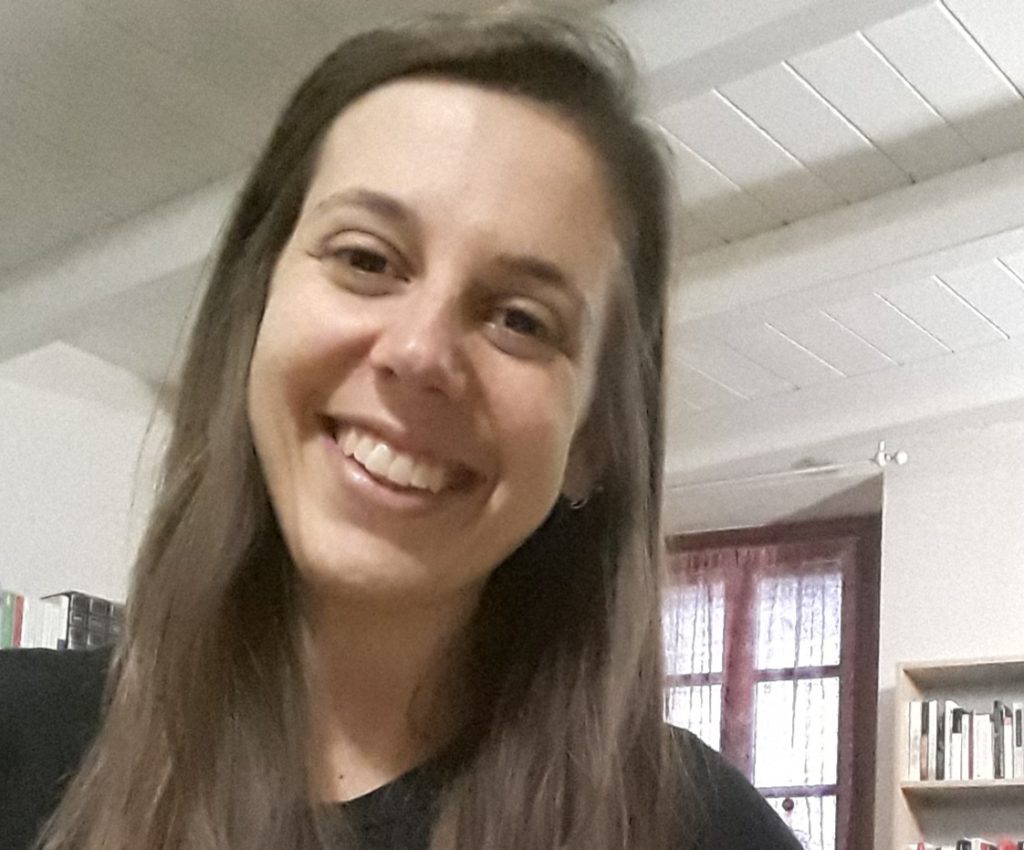Can you tell us a bit about your professional activity?
Ciao! I’m an independent translator, I translate from French and Portuguese to Italian, which is my native language. I work mostly on marketing and technical translations, as well as web localization.
What studies did you complete? Why did you choose to learn French?

My personal education ran a bit backwords: I started by learning French “in the field”, then I certified my knowledge and completed it with a bachelor’s degree I foreign languages.
After my A-levels, I still wasn’t too sure what I wanted to do, so I left my little town in the north of Italy and headed to Paris. Honestly, I didn’t even speak a single word of French! I chose Paris because I was, and in fact still am, a huge fan of art. I told myself that perhaps I could find inspiration there. I know, it’s kind of cliché, but it’s what happened! Once I arrived, I realized that I had a really good knack for learning languages. At the time, I worked in an Italian restaurant and my French and Algerian colleagues were always teaching me new words. After a few weeks, I was able to get by on my own, and it was then that I understood languages were my future.
So, I signed up for university: I received a bachelor’s in languages between Venice and Paris. A few years later, I received my master’s in literary translation from the University of Lyon, followed by a series of different specializations, including technical translation, web localization, transcreation… In all, I spent about 8 years in France, and about as long with my nose in books!
How did you come to the idea of being an independent translator?
During my studies in Paris, I began donating my time to help translate for an Italian media outlet that published translated foreign news articles. It was a tiny, local version of the Courrier International, in the form of a free blog; it was a wonderful project. But I hadn’t yet decided to make it my career! It all clicked while I was completing my masters in political science at Venice (yes, languages aren’t my only passion!).
In my class, there was a Mozambican writer who was part of a little group of poets from Mozambique, where they speak Portuguese, a language I had picked up earlier. We became friends and he offered to have me translate for them. Less than a year later, I found myself at the Turin International Book Fair to present my translation of two of their books, which were published by a small Italian publisher. It was a great experience and, above all, the pleasure that I took each time someone came up to me with a text to translate definitively convinced me to get started in this domain and make it my career.
Who are your clients (activity sectors)?
Currently, I’ve been translating a lot for the textile, cosmetics, electronics, and tourism industry, and more and more regularly in the sector of renewable energy. I really love everything dealing with new technologies too. As an independent translator, I work mostly with translation agencies, the majority of which are based in France.
What does the translation process look like for you?
It all depends on the type of the translation, as well as the time and resources available to me. Generally, I try to understand what type of approach I need to adopt. If it’s a technical document, for example, an operator’s handbook, I’ll bring out my dictionaries, potentially any previous translations I had done on the same subject before, I attempt to find reference documents of the same type in my language, and I attack the translation segment by segment, with meticulous attention to the terminology.
However, for any type of creative documents, first I have to analyse, not just the structure of the text, but also the target audience, the messages, the media that the message will be published on, etc. For these, unlike for technical translations, we’ll distance the translation from the source text in order to leave more room for creativity.
And then, if I have enough time, I let the translation sit for a few hours, ideally overnight, like a good pizza dough. This allows me to take a step back and then come back to the translation with a more critical and detached vision, in order to immediately identify any possible errors and see if the translation comes off natural in terms of the rhythm, the content, and the terminology.
Do the cultural differences between France and Italy make it more difficult to translate?
Between French and Italian, from a cultural perspective, there are more similarities and parallels than differences. What I find most difficult are the various formalities and courtesies, as well as the choice between “vous” and “tu” (formal or informal): there, yes, we have major differences between the two countries! In Italy, we have the tendency to immediately create proximity with the people we are speaking to and to speak informally, in real life as on the web. In France, it’s more or less the inverse that’s true. I faced some of these challenges myself my first few months in France: I had to force myself to speak with the formal “vous” when speaking to my employers or colleagues. And yet, in France, when you greet someone, you kiss cheeks (la bise)! That also what a catastrophe for me, it took me years to adopt the habit… and I still have troube with it, because, in Italy, we shake hands… and at times, not even that! All of this is part of a greater cultural approach that can be reflected in text, and it takes a lot of reflection before starting a translation.
Have you noticed a change in the kinds of projects sent to you from your clients?
Happily, I’ve seemed to notice my projects are more and more oriented toward new technologies. Markets are moving towards ever-more-digitalized commerce and services, and therefore over the last few years, I’ve noted an increase in localization projects. And I’m so happy about it, I love it!
What difficulties do you face in your job, but also, what do you appreciate the most?
What I enjoy the most is also that which is the most difficult… that is to say, being independent. You have to rely on yourself for everything, from commercial relations, to administrative work and accounting. It can be very tiring. But, on the other hand, you are fully in control of your time. You choose your working hours, and, above all, where you work from. Personally, I adore travelling: over the last few years, after leaving France, I traversed Eastern Europe, Southeast Asia, and I spent a long time in Maghreb. I was able do all this while working regularly, doing the work that I enjoy. It’s worth the little daily stresses we face in our line of work!
On top of that, translation allows me to constantly learn new thing, because, for each new subject I’m required to do research, to learn. Honestly, for me, it’s the best job in the world.
What advice would you give to someone who is interested in a career in translation?
Our job is artisanal. So, in order to get better and be competitive, you should start translating as much as possible while completing your studies; start by donating you work, for example. There are a lot of associations that need translators, as well as blogs, online magazines, etc. In short, the web offers a lot of opportunities to get started and gain experience. Then, start participating in events dedicated to translation (like the Giornata del Traduttore in Italy, Assises de la Traduction in France, etc.) to create a professional network, which is crucial. And never stop learning, because the translation industry is always evolving at a surprising speed.
And finally, always remember, “with great power comes great responsibility”. We are a bridge between different cultures, which makes us essential (and privileged!) but also responsible for the messages we communicate. For that, we have to do our best, not only to know the rules of grammar, but first and foremost, to learn, and listen… and respect other cultures.
Anything you want to add?
Yes, I’d like to take this opportunity to thank the super team at TradOnline, who I have been working with now for a few years. It’s a wonderful team, and is currently my best collaboration, both from a professional perspective and from a human one. Thanks, ladies!

